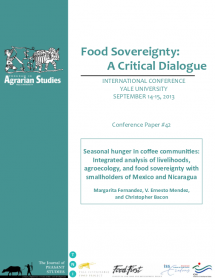Seasonal hunger in coffee communities Integrated analysis of livelihoods, agroecology, and food sovereignty with smallholders of Mexico and Nicaragua
Food sovereignty has recently gained momentum in social movements, farmer cooperatives and NGOs, as a framework that places farmer’s and nature’s rights as central to food and agricultural policy. Food sovereignty’s strength is that it outlines an alternative policy to the contemporary global agro-industrial food system.

Authors
However, it is only more recently that the concept of food sovereignty is being translated into unique policies, practices, and research approaches at different levels (i.e. international, national and local), and amongst different stakeholders, including governments, NGOs, research and development institutions and farmer cooperatives. In this paper we will present a participatory action research project undertaken with two coffee farmer cooperatives in Chiapas, Mexico and northern Nicaragua, which are implementing food security and food sovereignty projects through agroecological practices. In doing so, we will discuss how the integration of a diverse set of concepts including agroecology, sustainable livelihoods, political ecology, and food sovereignty, guided the exploration of these complex and dynamic issues at an empirical level. We also present an analysis of how NGOs, cooperatives and farmers perceive and translate the principles of food sovereignty and agroecology into practice. As smallholder farmers who are linked to both the global commodity market and to diverse subsistence production systems, they represent interesting examples of how the concept of food sovereignty is molded and framed to fit the realities of livelihoods in two different contexts.
Margarita Fernandez PhD candidate in Agroecology, University of Vermont. Fernandez’s dissertation work uses participatory action research to explore the relationship between agroecology, food sovereignty, climate change and livelihoods with coffee communities of Mexico and Nicaragua. She has over 15 years’ experience working on a range of food systems initiatives in urban and rural landscapes of Mexico, Nicaragua, Laos, Cuba and the US. She holds a Masters from Yale F&ES and a BS from Tufts University.
V. Ernesto Méndez Associate Professor of Agroecology, University of Vermont. Professor Méndez works with smallholder coffee cooperatives in Mesoamerica and a variety of growers in Vermont. His research uses agroecology as a transdisciplinary, participatory and action-oriented approach focusing on the interactions between agriculture, farmer livelihoods and environmental conservation.
Christopher Bacon Assistant Professor, Department of Environmental Studies and Sciences, Santa Clara University. Professor Bacon’s primary research examines the political ecology of conventional and alternative food systems and their impacts on rural development in northern Nicaragua. He often uses a community-based participatory action research approach. In addition to continued work in Central America, he recently initiated research focused on environmental and food justice in San Jose, California. Previous work has been published in the Journal of Peasant Studies, Ecology and Society, and World Development.
Food Sovereignty: a critical dialogue, 14 - 15 September, New Haven.